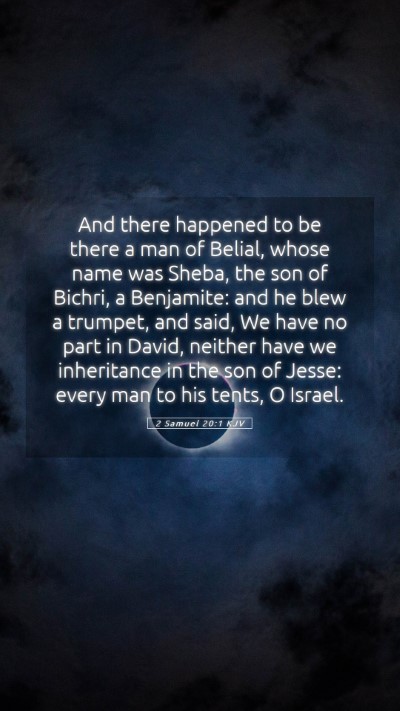Understanding 2 Samuel 20:1: A Comprehensive Bible Verse Commentary
Bible Verse: 2 Samuel 20:1
Verse Text: "And there happened to be there a man of Belial, whose name was Sheba, the son of Bichri, a Benjamite: and he blew a trumpet, and said, We have no part in David, neither have we inheritance in the son of Jesse: every man to his tents, O Israel."
Overview of 2 Samuel 20:1
This verse marks the emergence of Sheba, a man who instigated rebellion against King David after Absalom's defeat. It signifies a critical moment in the narrative of David’s reign, reflecting the tumultuous political landscape of Israel during this period. The actions of Sheba and the sentiment of his followers highlight the fractious nature of the tribes of Israel and their complex relationship with the monarchy.
Bible Verse Meanings
The events surrounding 2 Samuel 20:1 can be unpacked through several layers of meaning:
- Rebellion: Sheba’s rallying cry represents not just personal discontent but a broader discontent amongst certain factions of Israel against David's rule.
- Division: The phrase “We have no part in David” underscores a significant division within the nation, echoing themes of unity and division prevalent throughout biblical history.
- Leadership:** David’s leadership is put to the test as he faces opposition even after a major victory, questioning his ability to maintain peace and loyalty.
Bible Verse Interpretations
Public domain commentaries provide insights into the implications of this verse:
- Matthew Henry: Henry emphasizes the suddenness of Sheba's actions and views them as a test of David's authority. He notes that even a single man can stir considerable strife and lead many away from loyal service to the king.
- Albert Barnes: Barnes highlights the historical context, explaining that this verse illustrates the ongoing struggles within Israel as factions vie for power. He points out that Sheba’s actions symbolize the failure to achieve a lasting peace after Absalom's insurrection.
- Adam Clarke: Clarke speaks to the dynamics of kinship and tribal allegiance, explaining why the Benjamites, particularly, might feel aggrieved by David’s kingship given his roots in Judah.
Bible Study Insights
For those seeking deeper understanding, the following insights can guide your study:
- Historical Context: Acknowledge the historical backdrop of Israel’s tribal divisions and the significance of Sheba's challenge in the larger narrative of the monarchy.
- Moral Lessons: Reflect on how human ambition and pride can lead to disunity and strife. Consider how these themes are relevant in contemporary life and communities.
- Application to Daily Life: Explore the importance of choosing allegiance wisely, whether to leaders, communities, or ideologies, emphasizing loyalty and unity.
Significance of 2 Samuel 20:1
This verse serves as a pivotal moment in the story of David and Israel. It reflects themes of rebellion, the nature of leadership, and the societal dynamics within a nation facing disunity.
Bible Cross References
- 1 Kings 12:16: Reflects on the divisions in the kingdom and the people's sentiments regarding kingship.
- 2 Samuel 19:43: Captures the division among the tribes of Israel after David's return, providing background to the events leading to Sheba's rebellion.
- 2 Samuel 15:13-14: Discusses Absalom's rebellion and the unrest that preceded Sheba's actions.
Conclusion
2 Samuel 20:1 is more than just a historical account; it prompts us to consider our own responses to leadership and community. As believers and scholars, engaging with the lessons embedded in this verse enriches our understanding and guides our interactions within our own communities.


